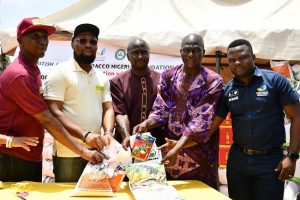In a collaborative act to enhance the capabilities and resources of maize farmers in Ogun State, the British American Tobacco Foundation (BATNF), in partnership with the Ogun State Ministry of Agriculture, has undertaken a significant initiative.

The project is aimed at equipping approximately 1,000 maize farmers with the knowledge and skills to enhance productivity, profitability, and sustainability within the maize value chain.
Since its inception in 2002, BATNF has been in the vanguard of empowering smallholder farmers, particularly in the areas of crop production, entrepreneurship, and environmental sustainability, through its projects aimed at enhancing agricultural productivity, improve livelihoods, and promote social and economic development in rural communities across Nigeria.
BATNF through partnerships with government agencies such as the Ogun State Ministry of Agriculture implements a variety of programmes and initiatives tailored to address the distinct needs of farmers and rural residents.
Speaking at the event, Bolu Owotomo, Ogun State Commissioner for Agriculture, noted that the project was geared towards promoting food security and improving the livelihood of farmers in the state.
He said, “Through the Maize Empowerment project, the BATN Foundation has trained 1,000 farmers in best agricultural practices and today we are witnessing the distribution of farm inputs and pesticides to 500 for this year’s planting season in order to ensure a bountiful harvest.”
On his part, Oludare Odusanya, General Manager, BATNF, in his remarks stated that the collaborative effort between the BATN Foundation and the Ogun State Ministry of Agriculture is aimed at enhancing the capabilities of maize farmers in Ogun State.
He noted, “This maize project is specifically aimed towards ensuring inclusivity and equitable distribution of resources, thereby focusing on empowering women and youths in order to enhance their knowledge, skills, and resources for increased productivity, profitability, and sustainability within the maize value chain across the state’s Agricultural Zones.”
Odusanya further emphasised that the objective of the BATN Foundation was geared towards improving the technical know-how of the farmers, fostering innovation, promoting sustainable practices and facilitating access to profitable markets.
While acknowledging the impact the project had on the maize farmers in the state, Odusanya mentioned that the BATN Foundation has invested over N4 billion towards supporting rural smallholder farmers and impacted over 1.7 million beneficiaries across the 36 states of the federation and the FCT since its inception in 2002.
He said, “This project addresses critical challenges in the maize value chain, including low crop yields, limited access to improved seeds and fertilisers, inefficient pest and disease management, poor pest-harvest handling, and lack of access to profitable markets.”
The project included training workshops centred on Good Agronomic Practices (GAP), soil management, integrated pest management (IPM), post-harvest handling, and financial literacy.
Additionally, it involved establishing five demonstration plots, conducting Green Field Days, and distributing inputs.
By Ajibola Adedoye
